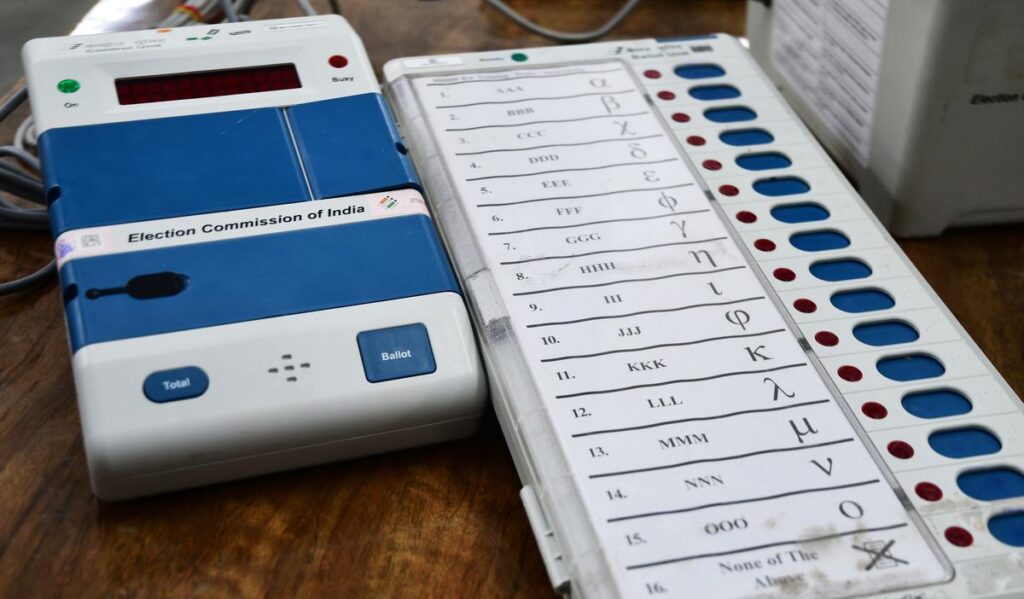‘EVMs A Threat To Fair ’24 Lok Sabha Elections’
Feb 4, 2024 | Pratirodh Bureau
The protesters argued that the use of EVMs jeopardises the democratic process; they also alleged that EVMs are vulnerable to hacking and pose a threat to the fair conduct of elections
On Thursday, February 2, thousands of Ambedkarites, lawyers and other members of civil society gathered at Delhi’s Jantar Mantar to stage a protest demonstration, demanding a ban of electronic voting machines (EVMs).
The protesters argued that the use of EVMs jeopardises the democratic process; they also alleged that EVMs are vulnerable to hacking and pose a threat to the fair conduct of elections.
Protesters for the above cause have been raising concerns about EVMs across pockets of India for an extended period of time. They initiated the #EVM_ban campaign ahead of the upcoming 2024 general elections, which are due in either April or May (dates are yet to be announced), lending particular urgency to the issue this quarter.
Recently, Jantar Mantar saw another demonstration on 31 January as well.
One protester at Jantar Mantar said, “We have been taking up this issue for a very long time, and now, with the general elections 2024 just around the corner, we have started this campaign to bring this issue to attention afresh. A big agitation is going on across the country to remove EVMs. The public wants to remove EVMs. We will remove EVMs from this country…”
Several of the demonstrators present at the venue highlighted that the Election Commission had challenged anyone to prove that EVMs could be hacked and that the Samyukt EVM Hatao Desh Bachao Morcha, led by lawyers of the Supreme Court, had accepted this challenge. However, the Election Commission did not acknowledge the challenge and the activists were not given the opportunity to submit a memorandum to the office of the Election Commission.
Earlier, protesters at Jantar Mantar had urged the commission to provide them with 50 EVMs to test, asserting that they could demonstrate how the machines could be manipulated in various locations.
The activists said that their main objective is to point out/reveal the vulnerabilities of the EVMs and advocate for a shift back to traditional paper ballots.
Last year, in Kanpur, protests reflected a growing conviction among several sections of society, which included legal professionals, against the continued use of EVMs. There were also demands for a return to traditional voting methods, which have gained momentum ahead of the 2024 general elections, which are being considered crucial.
The Supreme Court, in November 2023, while hearing a petition, made observations that amplifying the scale of cross-checling EVM data with the voter-verifiable paper audit trail (VVPAT) records may not offer any significant advantages. They might, instead, only burden the Election Commission with additional work.
Meanwhile, simultaneously, in Kanpur, Uttar Pradesh, a group of lawyers assembled in the courthouse premises; they burnt an effigy of an EVM and demanded the withdrawal of EVM usage in elections.
The lawyers, holding banners, expressed their preference for ballot papers, asserting that they ensure free and fair elections without the risks associated with EVMs.
Till now, the Election Commission’s campaign to restore the public’s faith in the EVM has left a significant number of citizens unconvinced.
Electronic voting is the standard means of conducting elections using Electronic Voting Machines (EVMs) in India. The system was developed and tested by the state-owned Electronics Corporation of India and Bharat Electronics in the 1990s.
They were introduced in Indian elections between 1998 and 2001, in a phased manner. Prior to the introduction of electronic voting, India used paper ballots and manual counting.
The paper ballots method was widely criticised because of fraudulent voting and booth capturing, where party loyalists captured booths and stuffed them with pre-filled fake ballots. The printed paper ballots were also more expensive, requiring substantial post-voting resources to count hundreds of millions of individual ballots.
